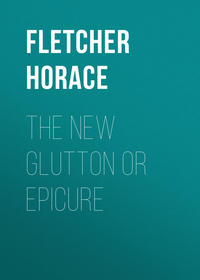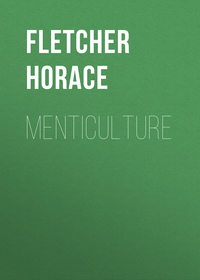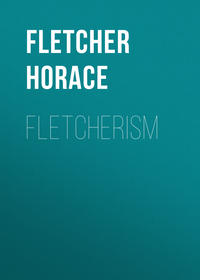 полная версия
полная версияHappiness as Found in Forethought Minus Fearthought
This being the closing chapter of my book, and being especially possessed of my subject and desirous of being understood, I may be pardoned for offering a brief syllabus of my effort as a benediction.
I have endeavored to show that fearthought is the arch-enemy of civilized man. Through the fears of his progenitors, it is the cause of the weaknesses he inherits; and through his own permission, it is also the cause of his personally acquired ill health, ill success, discontent and unhappiness. Fearthought, however, can be eradicated from the habit-of-thought of even the most timid persons, who are cursed by the hereditary affliction of fear, or by their own weak habit-of-thought, by persistent counter-suggestion, as soon as they are convinced of the possibility of freedom, and have thereby, learned the profitable point-of-view regarding it. I have shown that forethought becomes strong-thought as soon as fearthought, or weak-thought, is separated from it; that the condition of harmony which is created by the eradication of fearthought, is the normal condition in civilized nature; that growth is immediate and strong within the harmonic atmosphere thus created; that happiness is the certain result; and that fearthought and its various expressions are the basic deterrents to growth and happiness in man. That God, in the process of Evolution, has developed Man to the point where he executes the Higher Law of Harmony through the exercise of Divine Selection in modifying the brute law of "the survival of the fittest" (or, strongest), and thereby proves the "superiority of mind over matter." That God has created a partnership between Growth and Man, which is properly distinguished as the Man-Nature partnership. That the functions of the partners are clearly defined by rigid limitations; Nature doing all the growing without harmonizing or cultivating anything; while Man performs all of the harmonizing or cultivating, but none of the growing. That Man's only method of harmonizing or cultivating is through learning and removing the deterrents to growth. That in watering plants, Man removes the deterrent, drouth. That in building hot-houses, Man removes the deterrent, cold. That in oiling machinery, Man removes the deterrent, friction. That in refusing to be the bondman of fearthought and anger and worry, Man escapes the only deterrents within himself, to harmony, health, growth and happiness. And, that in cultivating Appreciation all of the possibilities of Happiness are opened to him.
I have tried to show that one of the great deterrents to growth and the acquisition of happiness is nursed by focussing the point-of-view on worn-out traditions, instead of on the present accomplishments and acceleration of progress in which all of the elements of happiness rest. That while happiness is possible to all under present conditions, indications point to the possibility, within the assured possession of surplus wealth-of-means, that Altruism may soon "have an inning," during which conditions will be so rearranged that dire poverty and unhappiness will be impossible to any but the perverse. That normal, civilized human nature is good nature, and that if conditions are intelligently arranged most men will eagerly mold themselves into good men to fit the conditions. That the Material Age has become so rich that it can now afford leisure to give attention to the Higher Self, and in so doing will soon refuse to permit any one born under the prejudices and the protection of the Nation – the social family – to be ignorant nor idle nor poor; that the era of the three great A's – Appreciation, Attraction and Altruism – is upon us, and that it will inaugurate the Age of the Higher Self, wherein Man will realize that he is not simply the highest among animals, but is endowed with divine possibilities, and cannot longer be respectable with only animal characteristics. That the resetting of the gauge of respectability rendered necessary by the Awakening, and the new conditions that must grow out of it, will be above the toleration of anything that is unaltruistic, as surely as the gauge of the present is above the toleration of petty thieving and convicted perjury.
There is not only hope, but there is assurance, of harmonic conditions in the signs of the times and in the constantly increasing acceleration of progress.
A BEGINNING AND NOT AN END
It is argued that the Stoics and other philosophers of ancient Greece attained the perfection of self-control, and successfully suppressed, and even eliminated, all of the passions and desires which so commonly dominate man, and attained thereby a state of happiness that is quite unknown in the present times of ostentation and ambition; but that the result was a state of lethargic indifference, that became more fatal to growth and progress in the end than any known condition of tumult and competition in the history of the race.
This is undoubtedly a just arraignment of the result of the Grecian philosophical teachings but, at the same time, the reason for so unhappy a result is not difficult to find.
The Greeks cultivated self-control and the harmonic conditions growing out of it as an end, and not as a preparatory means to growth. They prepared a weedless and wormless soil within the mind, but in it planted poppies, breathed of their poisonous perfume, and slept the sleep of indifference, which leads to the sleep called death.
Since the time of the Stoics, the world has been told by the God-Man Jesus of Nazareth, that living means growing, that true happiness is gained only through works in the service of something, that the necessary attribute of perfect manhood is spontaneous altruism, and that there is no other road towards growth, refinement, spirituality and happiness than along the way made easy by consistent altruism.
During the time that has passed since the power and glory of Hellas began to wane, mankind has had experience with the forces of nature and the efficacy of machinery to teach the great universal law of compensation, which is also the law of happiness. This great law prescribes that there shall be no balance without support or motion, no poise without alertness, no life without growth, and no happiness without service.
Learning a wise lesson from the law of compensation, man has come to appreciate the value of a wormless and weedless soil, but he has learned to plant in it trees that bear altruistic fruit, instead of the poppy of sloth and indifference, which is now classed as a poisonous weed; he has learned to clean and polish the journals of his engines and has invented balance wheels to regulate, and ball bearings to accelerate, their power; but not for the purpose of idleness.
The decadence of Greek manhood was not the result of culture, but the result of the uses to which it was put, and hence we should not condemn culture, nor cultivate friction, as an antidote for decadence, because Greek civilization did not defend itself against assault and decay, but, rather, let us emulate the good they achieved, and cultivate the power they attained, and use them as a beginning and not as an end.
APPENDICES
APPENDIX A
THE INFLUENCE OF FEAR IN DISEASEBy Dr. Wm. H. HolcombOur sanitarians are doing a good work in exploring the physical causes of disease, and endeavoring to protect the individual and the public health. But there is a higher and larger sphere of causes which they have seldom penetrated, and of whose existence even many of them seem to be ignorant. I allude to the extraordinary influence of affection and thought, or of emotion and ideas, in the causation and prevention of disease.
The body is a mirror, in which all the states of the soul are reflected. We are familiar with the wonderful effects of the will, the passions, the emotions, of the imagination, sympathy, hope, fear, faith, and confident expectation upon the physical system. We are accustomed to regard the phenomena as illustrations of the fact that the soul can, under certain circumstances, act powerfully upon the body, with the tacit assumption, however, as a general rule, that the body executes all the functions by chemical or mechanical law, without the necessary intervention of any mental influences whatever. This is the great illusion of the materialist.
Imagination, intellect, will, emotion, faith, hope, expectation, etc., are only states or modes of the soul's own life, and they are in perpetual activity, whether we are conscious of it or not. The operations of the soul of which we are not conscious, are almost infinite in comparison with the very small portion of them which comes at any moment within the range of our external consciousness. The soul organizes its own body in the womb of the mother, holds all its parts together in due order and functional activity during life, and when he quits it at death, its material tenement falls into dissolution.
The mind of man is constantly at work, silently pervading every tissue of his body by its vital influence, repeating itself in every function, throbbing in the heart, breathing in the lungs, reflecting itself in the blood, weaving its own form into every act of nutrition, realizing its own life in every sensation, and working its own will in every motion. The power of the mind over the body indeed! There is no power in the body, but in the mind, for the body is the mind, translated into flesh and blood.
When a limb is broken – the bones shattered, the flesh torn, the blood-vessels severed, the nerves lacerated, what can the surgeon or doctor do to repair the injury? A little outside mechanical work. He ligates, he stitches, he plasters, he fixes the parts in apparatus so they will remain motionless in the natural position. He can do no more. The soul which creates the body and keeps it in health, repairs it when injured. By her own occult forces she regulates the movement of the blood and development of nerve power, the chemical decomposition and re-combination, going on in every tissue, according to ideas and models implanted upon her by the Divine Mind, the Over-Soul of the universe.
The old writers call this wonderful power the vis medicatrix naturi, the curative power of nature. Swedenborg, for whom nature has no powers underived from spiritual sources, teaches that this vital power is the soul itself. His view that the soul itself acts unconsciously to our perceptions in the development and conservation of the body is advocated by Morell in his "Elements of Psychology," and is highly spoken of by Professor William B. Carpenter.
When we have constructed a true psychological pathology, we shall understand clearly why and how it is that fear can turn the hair gray in a single night; that a mother's milk can be poisoned by a moment of terror; that the heart may be paralyzed by a sudden joy or sorrow; that dyspepsia, paralysis, and many other diseases are produced by mental worry and fret and the brain-fag of overwork and anxiety. Yea, we will understand that away back of all physical causation, the roots of our disease originate in the spiritual conditions of the race, in our false religions, our false philosophies, our false way of thinking, our false relations to God and each other.
The most extensive of all the morbid mental conditions which reflect themselves so disastrously on the human system, is the state of fear. It has many degrees or gradations, from the state of extreme alarm, fright, or terror, down to the slightest shade of apprehension of impending evil. But all along the line it is the same thing – a paralyzing impression upon the centers of life which can produce, through the agency of the nervous system, a vast variety of morbid symptoms in every tissue of the body.
We have very seldom reflected upon the fact that fear runs like a baleful thread through the whole web of our life from beginning to end. We are born into the atmosphere of fear and dread, and the mother who bore us had lived in the same atmosphere for weeks and months before we were born. We are surrounded in infancy and childhood by clouds of fear and apprehension on the part of our parents, nurses, and friends. As we advance in life we become, instinctively or by experience, afraid of almost everything. We are afraid of our parents, afraid of our teachers, afraid of our playmates, afraid of ghosts, afraid of rules and regulations and punishments, afraid of the doctor, the dentist, the surgeon. Our adult life is a state of chronic anxiety, which is fear in a milder form. We are afraid of failure in business, afraid of disappointments and mistakes, afraid of enemies, open or concealed; afraid of poverty, afraid of public opinion, afraid of accidents, of sickness, of death, and unhappiness after death. Man is like a haunted animal from the cradle to the grave, the victim of real or imaginary fears, not only his own, but those reflected upon him from the superstitions, self-deceptions, sensory illusions, false beliefs and concrete errors of the whole human race, past and present.
If fear produces disease, acute or chronic, suddenly or gradually, through the correlations existing between the spirit and the body, how can there be a genuinely and perfectly healthy man or woman in the world? There is none.
That fear does produce all kinds of disease, has been frequently observed and fully substantiated by the medical profession. Dr. Tuke, in his admirable book, "Influence of the Mind upon the Body," cites well authenticated instances of the following diseases as having been produced by fear or fright: Insanity, idiocy, paralysis of various muscles and organs, profuse perspirations, cholerina, jaundice, turning of the hair gray in a short time, baldness, sudden decay of the teeth, nervous shock followed by fatal anæmia, uterine troubles, malformation of embryo through the mother, and even skin disease – erysipelas, eczema, and impetigo.
We observe in this list that fear not only affects the mind and the nervous and muscular tissues, but the molecular chemical transformations of the organic network, even to the skin, the hair, and the teeth. This might be expected of a passion which disturbs the whole mind, which is represented or externalized in the whole body.
Dr. Tuke reiterates the fact which has been so frequently observed, that epidemics owe a great deal of their rapid extension and violence to the panic of fear which exists among the people. When yellow fever, cholera, smallpox, diphtheria, and other malignant diseases obtain a footing in a community, hundreds and thousands of people fall victims to their own mental conditions, which invite the attack and insure its fatality. When the disease was new and strange, as the yellow fever was to the interior in its visitation in 1878, when the doctors were not familiar with it, the nurses not trained to it, the people, having no confidence in its management, lost hope, their fears became excessive, and consequent mortality was frightful.
How does fear operate upon the body to produce sickness? By paralyzing the nerve centres, especially those of the vasomotor nerves, thus producing not only muscular relaxation, but capillary congestions of all kinds. This condition of the system invites attack, and there is no resilience, or power of resistance. The gates of the citadel have been opened from within, and the enemy may enter at any point.
What determines the specific nature of the disease which attacks a person thus prostrated by fear? Men are frequently prostrated by fear in storms or fire or earthquakes or accidents, and no disease results. It is because they have been not thinking and brooding over any special morbid conditions. But in an epidemic, say of yellow fever, the subjects connected with the disease are strongly pictured on the mind. They are talked of, read about, discussed and written about, until the mind is full of images of fever, delirium, black vomit, jaundice, death, funerals, etc. When such is the case, no microbes or bacteria are needed to produce an outburst of yellow fever. The whole mass of horrors already stamped upon the mind is simply reflected and repeated in the body.
"As a man thinketh, so is he," said Solomon. Thoughts become things, apprehensions take form and substance, and lo! the disease. In the height of his happiness and prosperity, Job permitted himself to brood in silent fear over the possibility of losses and misfortunes, and he had at last to exclaim, "The thing which I greatly feared has come upon me."
Sudden and great fears are not frequent. The fears of every day, the constant apprehensions and anxieties of life, which are really fears of impending evil, prey upon our vitality and lessen our power of resisting, so that any passing disease may be photographed on our minds and seen upon our bodies.
Fear is itself a contagious disease, and is sometimes reflected from one to another mind with great rapidity. It needs no speech or sign to propagate it, for by psychological laws we are just beginning to comprehend, it passes from one to another, from the healthy to the sick, from the doctor or the nurse to the patient, from the mother to the child. Thus malignant influences may be cast around us by even our best friends and would-be helpers, under whose baleful shadow, without our even knowing of its existence, we and our children may sicken and die.
The summer of 1888 was signalized by a moderately severe epidemic of yellow fever at Jacksonville, Florida, and a very extensive epidemic of fear throughout the Southern states. The latter disease was much more contagious than the former, and much less amenable to treatment. This mental malady visited every little town, village, and railway station, and kept the people in a chill of trepidation for many weeks. This causeless and senseless terror originated many precipitate and unjust measures of self-defense. Under its influence public and private rights were disrespected, and the panic greatly intensified. In a few cases the refugee was driven from the door, the hungry left unfed, the sick unattended. There was exhibited on a small scale, here and there, that same principle of terror which is manifested in a burning theatre, on a sinking ship, or in a stampeded army, when brave men suddenly become cowards, and wise men fools, and merciful men brutes.
Truly, something ought to be done for the moral treatment of yellow fever.
I will relate an anecdote of Dr. Samuel Cartwright, of Natchez, Mississippi, which furnishes an ideal type for the mental treatment of yellow fever.
It was away back in the thirties, and yellow fever was prevailing in New Orleans, and the places above it were in a state of watchful fear. A young Northern teacher, trying to return home, started from Woodville, Mississippi, and arrived at Natchez about midnight in a high fever. Dr. Cartwright was immediately called in. Early in the morning he summoned the officers of the hotel and all the regular boarders into the parlor and made them a little speech. "This young lady," he said, "has yellow fever. It is not contagious. None of you will take it from her; and if you will follow my advice you will save this town from a panic, and a panic is the hotbed of an epidemic. Say nothing about this case. Ignore it absolutely. Let the ladies of the house help nurse her, and take flowers and delicacies to her, and act altogether as if it were some every-day affair, unattended by danger. It will save her life, and perhaps in the long run many others."
It was agreed to by all but one person – a woman, who proceeded to quarantine herself in the most remote room of the establishment. The young teacher got well, and no one was sick in the house but the self-quarantined woman, who took yellow fever from fear, but happily recovered.
By his great reputation and his strong magnetic power, Dr. Cartwright dissipated the fears of those around him, and prevented an epidemic. For this grand appreciation and successful application of a principle – the power of mind and thought over physical conditions, a power just dawning on the perception of the race – he deserves a nobler monument than any we have accorded to heroes and statesmen.
The sanitarians of the present day would think on the contrary that Dr. Cartwright was worthy of condemnation and imprisonment. Dr. Cartwright, however, honestly believed that yellow fever was not a contagious disease. At that time the non-contagionists were numerous, learned, experienced, and respectable. The contagionists, however, finally carried the day in the face of innumerable evidences of non-contagion, which, strangely enough, have now about ceased to exist. Whether they transformed a non-contagious into a contagious disease by repeated and violent asseverations, which played upon and hypnotized the professional and public mind, is a subtle point for psychological investigation, not likely to be made by the present generation of doctors.
Can a non-contagious disease become contagious by mental action? The power of fear to modify the currents of the blood and all the secretions, to whiten the hair, to paralyze the nervous system, and even to produce death is well known. Its power to impress organic changes upon the child in the womb through the mother's mind is well established. When yellow fever is reported about and believed to be imminent and contagious, fear, combined with a vivid imagination of the horrors and woes of the pest, can precipitate sickness which will take on the form and color present to the thought, and yellow fever may spread rapidly from person to person, all through the medium of the mind. "Everything," said a great philosopher, "was at first a thought."
We see a non-contagious disease in the very process of transformation into a contagious one in the case of pulmonary consumption. It was observed occasionally that one of the married partners who had nursed the other through the disease fell a victim after a while to the same malady. Doctors and people began to suggest contagion. The cases of one attack following the other were noticed more and more, and were reported in the medical journals. It was spoken of, thought of, brooded over. The confirmatory cases were all carefully noted; the failures to infect were all ignored, as they always are by people who are looking for contagion. The germ theory has given a great impetus to the idea of contagion. Dr. Loomis actually classifies tuberculosis among miasmatic contagious diseases. Fear will do the rest. In another generation the occasional fact will be a common fact, and in still another, a fixed fact; and the contagiousness of consumption will be enrolled among the concrete errors of the profession. Such has probably been the genesis of all contagious diseases in the remote past.
Fear being recognized as a powerful cause of disease, and a direct and great obstacle to recovery, a wise sanitation will exert itself to prevent or antidote its influences. To eradicate fear is to avert disease, to shorten its duration, diminish its virulence, and promote recovery. How shall we accomplish it? By educating the people up to a higher standard of life. By teaching them a sounder hygiene, a wiser philosophy, a more cheerful theology. By erasing a thousand errors, delusions, and superstitions from their minds, and giving instead the light, the beauty, and the loveliness of truth. There is a mental and moral sanitation ahead of us, which is far more valuable and desirable than all our quarantines, inventions, experimentations, and microscopic search for physical causes.
I will draw the picture of a sick room in charge of physicians and nurse, by whom this enlighted sanitation has been ignored or unheeded. It is a chamber of fear, soon, in all probability, to be the chamber of death. The room is darkened, for they are afraid of the light, that emblem of God's wisdom which should shine into all rooms, except when it is disagreeable to the patient. The ventilation is insufficient, for draughts, you must know, are very dangerous. The friends have doleful faces, moist eyes, sad voices, which reveal danger and doubt, and they converse in subdued whispers, which alarm and annoy the patient. The nurse and the doctor sometimes talk of their cases before the sick man, tell how very ill they were, how they suffered, how they got well miraculously, or how they died. The sympathetic visitor regales his hearers, the patient included, with his or her knowledge of similar cases, and their results, the great amount of sickness prevailing, and the success or ill success of this or that doctor.







